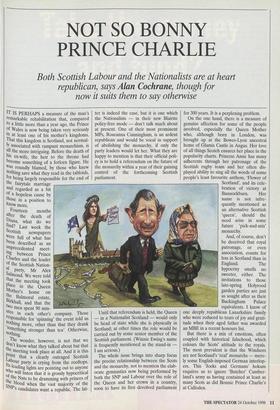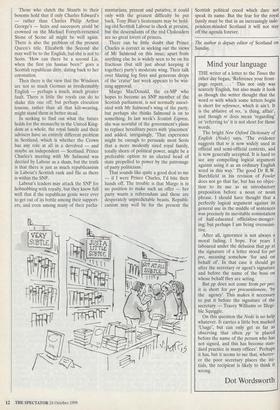NOT SO BONNY PRINCE CHARLIE
IT IS PERHAPS a measure of the man's remarkable rehabilitation that, compared to a little more than a year ago, the Prince Of Wales is now being taken very seriously in at least one of his mother's kingdoms. That this kingdom is Scotland, not normal- ly associated with rampant monarchism, is all the more intriguing. Before the death of his ex-wife, the heir to the throne had become something of a forlorn figure. He was roundly blamed, by those who knew nothing save what they read in the tabloids, for being largely responsible for the end of the fairytale marriage and regarded as a bit of a hopeless cause by those in a position to know more.
The wonder, however, is not that we o't know what they talked about but that meeting took place at all. And it is this Piiint that a clearly outraged 'Scottish l'abt3ur ts leading is crying from the rooftops. ing lights are pointing out to anyone who will listen that it is grossly hypocritical °I the Nats to be dramming with princes of the blood when the vast majority of the candidates want a republic. The lat- ter is indeed the case, but it is one which the Nationalists — in their new Blairite policy-free mode — don't talk much about at present. One of their most prominent MPs, Roseanna Cunningham, is an ardent republican and would be vocal in support of abolishing the monarchy, if only the party leaders would let her. What they are happy to mention is that their official poli- cy is to hold a referendum on the future of the monarchy within a year of their gaining control of the forthcoming Scottish parliament.
Until that referendum is held, the Queen — in a Nationalist Scotland — would only be head of state while she is physically in Scotland; at other times the role would be carried out by some senior member of the Scottish parliament. (Winnie Ewing's name is frequently mentioned as the stand-in — I am serious.) The whole issue brings into sharp focus the precise relationship between the Scots and the monarchy, not to mention the elab- orate gymnastics now being performed by both the SNP and Labour over the role of the Queen and her crown in a country, soon to have its first devolved parliament for 300 years. It is a perplexing problem.
On the one hand, there is a measure of genuine affection for some of the people involved, especially the Queen Mother who, although born in London, was brought up at the Bowes-Lyon ancestral home of Glamis Castle in Angus. Her love of all things Scotch ensures her place in the popularity charts. Princess Anne has many adherents through her patronage of the Scottish rugby team and her often dis- played ability to sing all the words of some people's least favourite anthem, 'Flower of Scotland', and its cele- bration of victory at Bannockburn. Her name is not infre- quently mentioned as an alternative Scottish 'queen', should the need arise in some future `pick-and-mix' monarchy.
And, of course, don't be deceived that royal patronage, or even association, counts for less in Scotland than in But there is a mix of emotions, often coupled with historical falsehood, which colours the Scots' attitude to the royals. The most prevalent is that the Windsors are not Scotland's 'real' monarchs — mere- ly some English-imposed German interlop- ers. This 'Jocks and Germans' hokum requires us to ignore 'Butcher' Cumber- land's army as having contained at least as many Scots as did Bonnie Prince Charlie's at Culloden. Those who clutch the Stuarts to their bosoms hold that if only Charles Edward's — rather than Charles Philip Arthur George's — heirs and successors could be crowned on the Michael Forsyth-returned Stone of Scone all might be well again. There is also the problem of the present Queen's title. Elizabeth the Second she may well be to the English, but she is not to Scots. 'How can there be a second Liz, when the first yin hasnae been?' goes a Scottish republican ditty, dating back to her coronation.
Then there is the view that the Windsors are not so much German as irredeemably English — perhaps a much, much greater fault. There is little the royals can do to shake this one off; but perhaps elocution Lessons, rather than all that kilt-wearing, might stand them in better stead.
In seeking to find out what the future holds for the monarchy in the United King- dom as a whole, the royal family and their advisers have an entirely different problem in Scotland, which is whether the Crown has any role at all in a devolved — and maybe an independent — Scotland. Prince Charles's meeting with Mr Salmond was decried by Labour as a sham, but the truth is that there is just as much republicanism in Labour's Scottish rank and file as there is within the SNP.
Labour's leaders may attack the SNP for hobnobbing with royalty, but they know full well that if the republican genie were ever to get out of its bottle among their support- ers, and even among many of their parlia- mentarians, present and putative, it could only with the greatest difficulty be put back. Tony Blair's lieutenants may be hold- ing old Scottish Labour in check at present, but the descendants of the red Clydesiders are no great lovers of princes.
There can be little doubt that Prince Charles is correct in seeking out the views of Mr Salmond on this issue; apart from anything else he is widely seen to be on his fractious (but still just about keeping it together) party's moderate wing. Their talk over blazing log fires and generous drops of the 'craw' last week appears to be win- ning approval.
Margo MacDonald, the ex-MP who hopes to become an SNP member of the Scottish parliament, is not normally associ- ated with Mr Salmond's wing of the party, but perhaps she thinks Salmond is on to something. In last week's Scottish Express, she was scornful of the government's plans to replace hereditary peers with `placemen' and added, intriguingly, 'That experience might be enough to persuade most Scots that a more modestly sized royal family, totally shorn of political power, might be a preferable option to an elected head of state propelled to power by the patronage of party politicians.'
That sounds like quite a good deal to me — if I were Prince Charles, I'd bite their hands off. The trouble is that Margo is in no position to make such an offer — her party wants a referendum and these are desperately unpredictable beasts. Republi- canism may well be for the present the Scottish political creed which dare not speak its name. But the fear for the royal family must be that in an increasingly inde- pendent-minded Scotland it will not stay off the agenda forever.
The author is deputy editor of Scotland on Sunday.



















































































 Previous page
Previous page